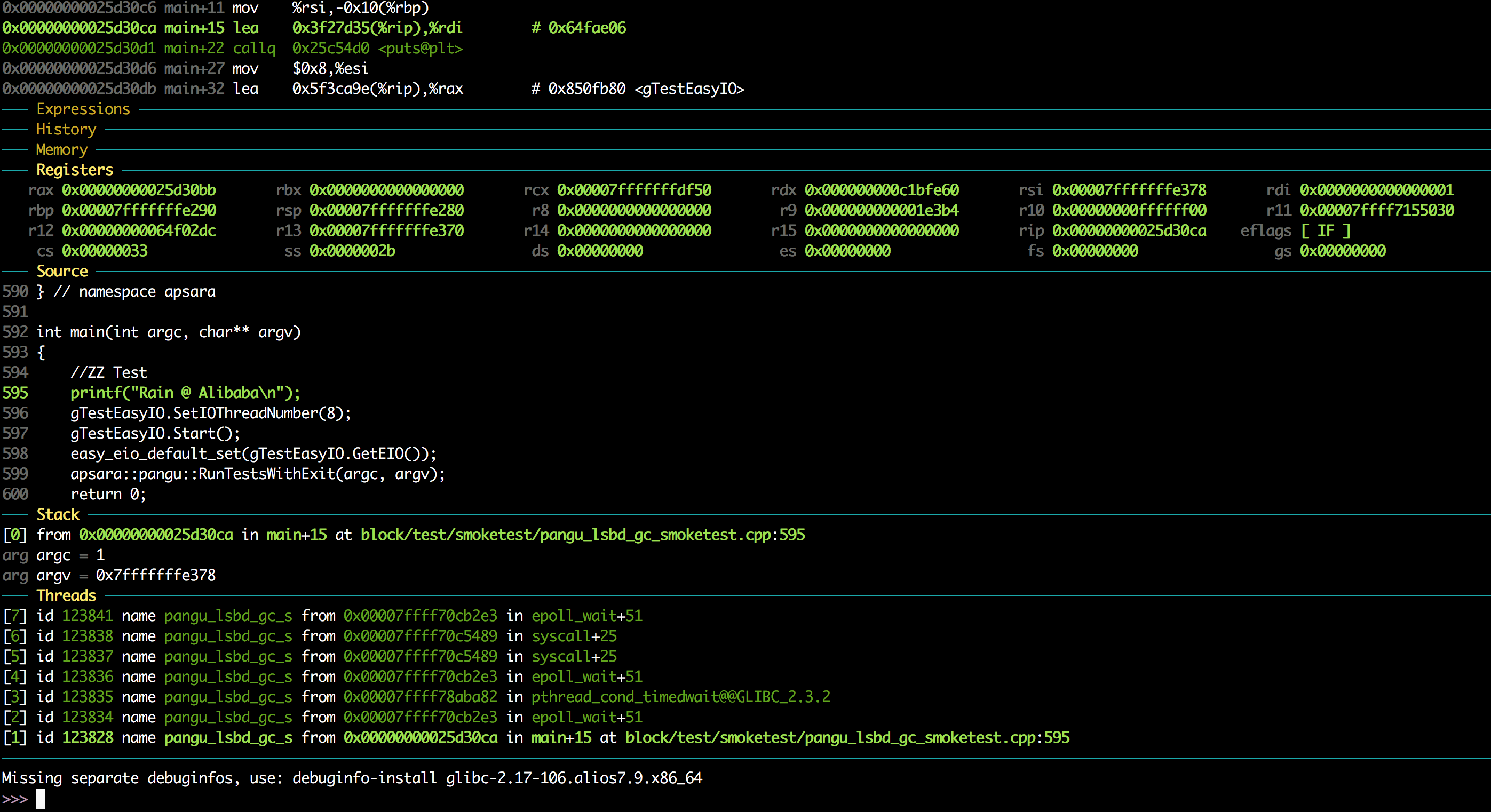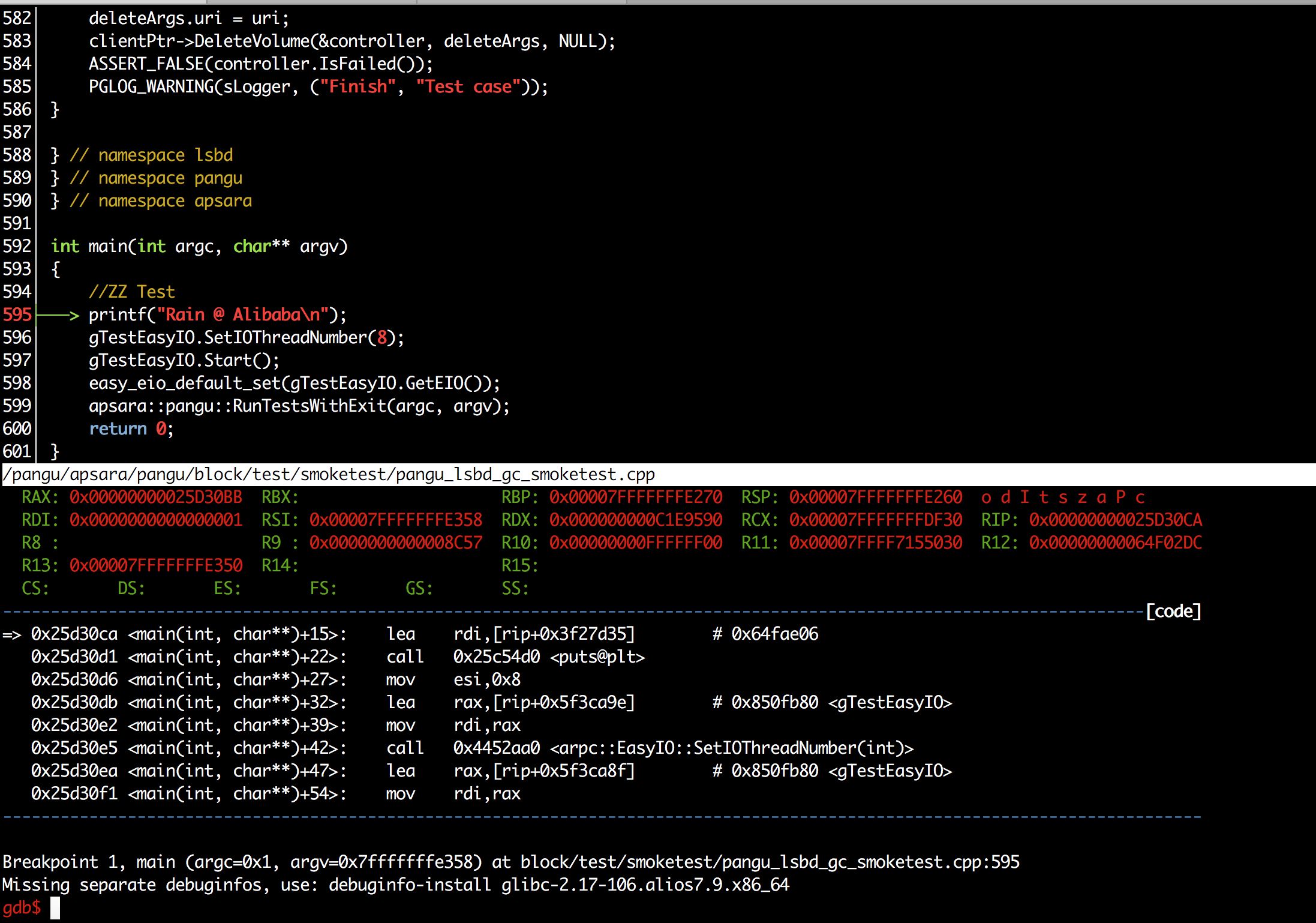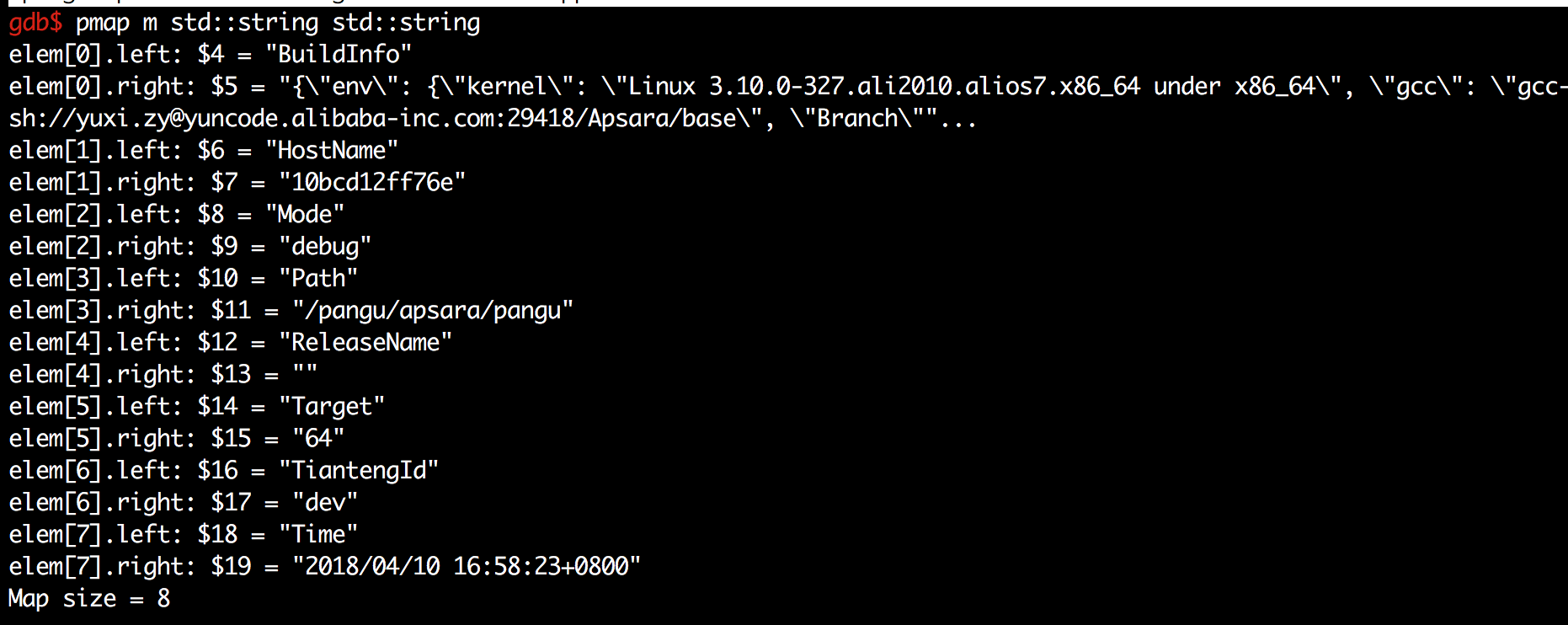GDB 配置
使用 GDB 扩展来配置 GDB
事实上我还是觉得原生的 GDB 就挺好,速度快,需要查看什么执行命令就可以。
GDB DashBoard
https://github.com/cyrus-and/gdb-dashboard
$sudo mkdir -m 777 ~/gdbinit; cd ~/gdbinit
$git clone https://github.com/cyrus-and/gdb-dashboard.git; sudo cp gdb-dashboard/.gdbinit ~/
$sudo echo 'set auto-load safe-path /' >> ~/.gdbinit
Gdbinit
https://github.com/gdbinit/Gdbinit
$cd ~/; $git clone https://github.com/gdbinit/Gdbinit.git
$sudo mv ~/.gdbinit ~/.gdbinit-rain; sudo cp ~/Gdbinit/gdbinit ~/.gdbinit
$sudo echo 'set auto-load safe-path /' >> ~/.gdbinit安装 CGDB
安装依赖项 makeinfo

$sudo yum install texinfo安装依赖项 ReadLine

# Compile and install readline
$cd ~/; wget http://git.savannah.gnu.org/cgit/readline.git/snapshot/readline-master.tar.gz
$tar -zxvf readline-master.tar.gz; cd readline-master/
$./configure
$make
$sudo make install
# Check current lib link
$ldconfig -p | grep 'readline\|history'
# Update lib link if needed
$sudo ldconfig /usr/local/lib配置 CGDB 编译
# Clone cgdb source
$cd ~/; git clone git://github.com/cgdb/cgdb.git; cd ~/cgdb
# Generate configure file which is not in source code
$./autogen.sh
# Configure cgdb to be installed to /usr/local
$./configure --prefix=/usr/local
# Compile
$make有可能在编译 ~/cgdb/lib/kui 会报如下错误
【原因】
kui.cpp 里面用了 C11 的特性 auto,但是在编译的时候 makefile 里面没有指定
【解决方法】
$vim ~/cgdb/lib/kui/Makefile 添加 -std=c++11 编译安装cgdb
编译安装cgdb
$sudo make & make install
打印 STL contaner
$cd ~/; wget http://www.yolinux.com/TUTORIALS/src/dbinit_stl_views-1.03.txt
$echo 'source ~/dbinit_stl_views-1.03.txt' >> ~/.gdbinit
# Run such command in GDB directly
# source ~/dbinit_stl_views-1.03.txtdbinit_stl_views-1.03.txt :
#
# STL GDB evaluators/views/utilities - 1.03
#
# The new GDB commands:
# are entirely non instrumental
# do not depend on any "inline"(s) - e.g. size(), [], etc
# are extremely tolerant to debugger settings
#
# This file should be "included" in .gdbinit as following:
# source stl-views.gdb or just paste it into your .gdbinit file
#
# The following STL containers are currently supported:
#
# std::vector<T> -- via pvector command
# std::list<T> -- via plist or plist_member command
# std::map<T,T> -- via pmap or pmap_member command
# std::multimap<T,T> -- via pmap or pmap_member command
# std::set<T> -- via pset command
# std::multiset<T> -- via pset command
# std::deque<T> -- via pdequeue command
# std::stack<T> -- via pstack command
# std::queue<T> -- via pqueue command
# std::priority_queue<T> -- via ppqueue command
# std::bitset<n> -- via pbitset command
# std::string -- via pstring command
# std::widestring -- via pwstring command
#
# The end of this file contains (optional) C++ beautifiers
# Make sure your debugger supports $argc
#
# Simple GDB Macros writen by Dan Marinescu (H-PhD) - License GPL
# Inspired by intial work of Tom Malnar,
# Tony Novac (PhD) / Cornell / Stanford,
# Gilad Mishne (PhD) and Many Many Others.
# Contact: dan_c_marinescu@yahoo.com (Subject: STL)
#
# Modified to work with g++ 4.3 by Anders Elton
# Also added _member functions, that instead of printing the entire class in map, prints a member.
#
# std::vector<>
#
define pvector
if $argc == 0
help pvector
else
set $size = $arg0._M_impl._M_finish - $arg0._M_impl._M_start
set $capacity = $arg0._M_impl._M_end_of_storage - $arg0._M_impl._M_start
set $size_max = $size - 1
end
if $argc == 1
set $i = 0
while $i < $size
printf "elem[%u]: ", $i
p *($arg0._M_impl._M_start + $i)
set $i++
end
end
if $argc == 2
set $idx = $arg1
if $idx < 0 || $idx > $size_max
printf "idx1, idx2 are not in acceptable range: [0..%u].\n", $size_max
else
printf "elem[%u]: ", $idx
p *($arg0._M_impl._M_start + $idx)
end
end
if $argc == 3
set $start_idx = $arg1
set $stop_idx = $arg2
if $start_idx > $stop_idx
set $tmp_idx = $start_idx
set $start_idx = $stop_idx
set $stop_idx = $tmp_idx
end
if $start_idx < 0 || $stop_idx < 0 || $start_idx > $size_max || $stop_idx > $size_max
printf "idx1, idx2 are not in acceptable range: [0..%u].\n", $size_max
else
set $i = $start_idx
while $i <= $stop_idx
printf "elem[%u]: ", $i
p *($arg0._M_impl._M_start + $i)
set $i++
end
end
end
if $argc > 0
printf "Vector size = %u\n", $size
printf "Vector capacity = %u\n", $capacity
printf "Element "
whatis $arg0._M_impl._M_start
end
end
document pvector
Prints std::vector<T> information.
Syntax: pvector <vector> <idx1> <idx2>
Note: idx, idx1 and idx2 must be in acceptable range [0..<vector>.size()-1].
Examples:
pvector v - Prints vector content, size, capacity and T typedef
pvector v 0 - Prints element[idx] from vector
pvector v 1 2 - Prints elements in range [idx1..idx2] from vector
end
#
# std::list<>
#
define plist
if $argc == 0
help plist
else
set $head = &$arg0._M_impl._M_node
set $current = $arg0._M_impl._M_node._M_next
set $size = 0
while $current != $head
if $argc == 2
printf "elem[%u]: ", $size
p *($arg1*)($current + 1)
end
if $argc == 3
if $size == $arg2
printf "elem[%u]: ", $size
p *($arg1*)($current + 1)
end
end
set $current = $current._M_next
set $size++
end
printf "List size = %u \n", $size
if $argc == 1
printf "List "
whatis $arg0
printf "Use plist <variable_name> <element_type> to see the elements in the list.\n"
end
end
end
document plist
Prints std::list<T> information.
Syntax: plist <list> <T> <idx>: Prints list size, if T defined all elements or just element at idx
Examples:
plist l - prints list size and definition
plist l int - prints all elements and list size
plist l int 2 - prints the third element in the list (if exists) and list size
end
define plist_member
if $argc == 0
help plist_member
else
set $head = &$arg0._M_impl._M_node
set $current = $arg0._M_impl._M_node._M_next
set $size = 0
while $current != $head
if $argc == 3
printf "elem[%u]: ", $size
p (*($arg1*)($current + 1)).$arg2
end
if $argc == 4
if $size == $arg3
printf "elem[%u]: ", $size
p (*($arg1*)($current + 1)).$arg2
end
end
set $current = $current._M_next
set $size++
end
printf "List size = %u \n", $size
if $argc == 1
printf "List "
whatis $arg0
printf "Use plist_member <variable_name> <element_type> <member> to see the elements in the list.\n"
end
end
end
document plist_member
Prints std::list<T> information.
Syntax: plist <list> <T> <idx>: Prints list size, if T defined all elements or just element at idx
Examples:
plist_member l int member - prints all elements and list size
plist_member l int member 2 - prints the third element in the list (if exists) and list size
end
#
# std::map and std::multimap
#
define pmap
if $argc == 0
help pmap
else
set $tree = $arg0
set $i = 0
set $node = $tree._M_t._M_impl._M_header._M_left
set $end = $tree._M_t._M_impl._M_header
set $tree_size = $tree._M_t._M_impl._M_node_count
if $argc == 1
printf "Map "
whatis $tree
printf "Use pmap <variable_name> <left_element_type> <right_element_type> to see the elements in the map.\n"
end
if $argc == 3
while $i < $tree_size
set $value = (void *)($node + 1)
printf "elem[%u].left: ", $i
p *($arg1*)$value
set $value = $value + sizeof($arg1)
printf "elem[%u].right: ", $i
p *($arg2*)$value
if $node._M_right != 0
set $node = $node._M_right
while $node._M_left != 0
set $node = $node._M_left
end
else
set $tmp_node = $node._M_parent
while $node == $tmp_node._M_right
set $node = $tmp_node
set $tmp_node = $tmp_node._M_parent
end
if $node._M_right != $tmp_node
set $node = $tmp_node
end
end
set $i++
end
end
if $argc == 4
set $idx = $arg3
set $ElementsFound = 0
while $i < $tree_size
set $value = (void *)($node + 1)
if *($arg1*)$value == $idx
printf "elem[%u].left: ", $i
p *($arg1*)$value
set $value = $value + sizeof($arg1)
printf "elem[%u].right: ", $i
p *($arg2*)$value
set $ElementsFound++
end
if $node._M_right != 0
set $node = $node._M_right
while $node._M_left != 0
set $node = $node._M_left
end
else
set $tmp_node = $node._M_parent
while $node == $tmp_node._M_right
set $node = $tmp_node
set $tmp_node = $tmp_node._M_parent
end
if $node._M_right != $tmp_node
set $node = $tmp_node
end
end
set $i++
end
printf "Number of elements found = %u\n", $ElementsFound
end
if $argc == 5
set $idx1 = $arg3
set $idx2 = $arg4
set $ElementsFound = 0
while $i < $tree_size
set $value = (void *)($node + 1)
set $valueLeft = *($arg1*)$value
set $valueRight = *($arg2*)($value + sizeof($arg1))
if $valueLeft == $idx1 && $valueRight == $idx2
printf "elem[%u].left: ", $i
p $valueLeft
printf "elem[%u].right: ", $i
p $valueRight
set $ElementsFound++
end
if $node._M_right != 0
set $node = $node._M_right
while $node._M_left != 0
set $node = $node._M_left
end
else
set $tmp_node = $node._M_parent
while $node == $tmp_node._M_right
set $node = $tmp_node
set $tmp_node = $tmp_node._M_parent
end
if $node._M_right != $tmp_node
set $node = $tmp_node
end
end
set $i++
end
printf "Number of elements found = %u\n", $ElementsFound
end
printf "Map size = %u\n", $tree_size
end
end
document pmap
Prints std::map<TLeft and TRight> or std::multimap<TLeft and TRight> information. Works for std::multimap as well.
Syntax: pmap <map> <TtypeLeft> <TypeRight> <valLeft> <valRight>: Prints map size, if T defined all elements or just element(s) with val(s)
Examples:
pmap m - prints map size and definition
pmap m int int - prints all elements and map size
pmap m int int 20 - prints the element(s) with left-value = 20 (if any) and map size
pmap m int int 20 200 - prints the element(s) with left-value = 20 and right-value = 200 (if any) and map size
end
define pmap_member
if $argc == 0
help pmap_member
else
set $tree = $arg0
set $i = 0
set $node = $tree._M_t._M_impl._M_header._M_left
set $end = $tree._M_t._M_impl._M_header
set $tree_size = $tree._M_t._M_impl._M_node_count
if $argc == 1
printf "Map "
whatis $tree
printf "Use pmap <variable_name> <left_element_type> <right_element_type> to see the elements in the map.\n"
end
if $argc == 5
while $i < $tree_size
set $value = (void *)($node + 1)
printf "elem[%u].left: ", $i
p (*($arg1*)$value).$arg2
set $value = $value + sizeof($arg1)
printf "elem[%u].right: ", $i
p (*($arg3*)$value).$arg4
if $node._M_right != 0
set $node = $node._M_right
while $node._M_left != 0
set $node = $node._M_left
end
else
set $tmp_node = $node._M_parent
while $node == $tmp_node._M_right
set $node = $tmp_node
set $tmp_node = $tmp_node._M_parent
end
if $node._M_right != $tmp_node
set $node = $tmp_node
end
end
set $i++
end
end
if $argc == 6
set $idx = $arg5
set $ElementsFound = 0
while $i < $tree_size
set $value = (void *)($node + 1)
if *($arg1*)$value == $idx
printf "elem[%u].left: ", $i
p (*($arg1*)$value).$arg2
set $value = $value + sizeof($arg1)
printf "elem[%u].right: ", $i
p (*($arg3*)$value).$arg4
set $ElementsFound++
end
if $node._M_right != 0
set $node = $node._M_right
while $node._M_left != 0
set $node = $node._M_left
end
else
set $tmp_node = $node._M_parent
while $node == $tmp_node._M_right
set $node = $tmp_node
set $tmp_node = $tmp_node._M_parent
end
if $node._M_right != $tmp_node
set $node = $tmp_node
end
end
set $i++
end
printf "Number of elements found = %u\n", $ElementsFound
end
printf "Map size = %u\n", $tree_size
end
end
document pmap_member
Prints std::map<TLeft and TRight> or std::multimap<TLeft and TRight> information. Works for std::multimap as well.
Syntax: pmap <map> <TtypeLeft> <TypeRight> <valLeft> <valRight>: Prints map size, if T defined all elements or just element(s) with val(s)
Examples:
pmap_member m class1 member1 class2 member2 - prints class1.member1 : class2.member2
pmap_member m class1 member1 class2 member2 lvalue - prints class1.member1 : class2.member2 where class1 == lvalue
end
#
# std::set and std::multiset
#
define pset
if $argc == 0
help pset
else
set $tree = $arg0
set $i = 0
set $node = $tree._M_t._M_impl._M_header._M_left
set $end = $tree._M_t._M_impl._M_header
set $tree_size = $tree._M_t._M_impl._M_node_count
if $argc == 1
printf "Set "
whatis $tree
printf "Use pset <variable_name> <element_type> to see the elements in the set.\n"
end
if $argc == 2
while $i < $tree_size
set $value = (void *)($node + 1)
printf "elem[%u]: ", $i
p *($arg1*)$value
if $node._M_right != 0
set $node = $node._M_right
while $node._M_left != 0
set $node = $node._M_left
end
else
set $tmp_node = $node._M_parent
while $node == $tmp_node._M_right
set $node = $tmp_node
set $tmp_node = $tmp_node._M_parent
end
if $node._M_right != $tmp_node
set $node = $tmp_node
end
end
set $i++
end
end
if $argc == 3
set $idx = $arg2
set $ElementsFound = 0
while $i < $tree_size
set $value = (void *)($node + 1)
if *($arg1*)$value == $idx
printf "elem[%u]: ", $i
p *($arg1*)$value
set $ElementsFound++
end
if $node._M_right != 0
set $node = $node._M_right
while $node._M_left != 0
set $node = $node._M_left
end
else
set $tmp_node = $node._M_parent
while $node == $tmp_node._M_right
set $node = $tmp_node
set $tmp_node = $tmp_node._M_parent
end
if $node._M_right != $tmp_node
set $node = $tmp_node
end
end
set $i++
end
printf "Number of elements found = %u\n", $ElementsFound
end
printf "Set size = %u\n", $tree_size
end
end
document pset
Prints std::set<T> or std::multiset<T> information. Works for std::multiset as well.
Syntax: pset <set> <T> <val>: Prints set size, if T defined all elements or just element(s) having val
Examples:
pset s - prints set size and definition
pset s int - prints all elements and the size of s
pset s int 20 - prints the element(s) with value = 20 (if any) and the size of s
end
#
# std::dequeue
#
define pdequeue
if $argc == 0
help pdequeue
else
set $size = 0
set $start_cur = $arg0._M_impl._M_start._M_cur
set $start_last = $arg0._M_impl._M_start._M_last
set $start_stop = $start_last
while $start_cur != $start_stop
p *$start_cur
set $start_cur++
set $size++
end
set $finish_first = $arg0._M_impl._M_finish._M_first
set $finish_cur = $arg0._M_impl._M_finish._M_cur
set $finish_last = $arg0._M_impl._M_finish._M_last
if $finish_cur < $finish_last
set $finish_stop = $finish_cur
else
set $finish_stop = $finish_last
end
while $finish_first != $finish_stop
p *$finish_first
set $finish_first++
set $size++
end
printf "Dequeue size = %u\n", $size
end
end
document pdequeue
Prints std::dequeue<T> information.
Syntax: pdequeue <dequeue>: Prints dequeue size, if T defined all elements
Deque elements are listed "left to right" (left-most stands for front and right-most stands for back)
Example:
pdequeue d - prints all elements and size of d
end
#
# std::stack
#
define pstack
if $argc == 0
help pstack
else
set $start_cur = $arg0.c._M_impl._M_start._M_cur
set $finish_cur = $arg0.c._M_impl._M_finish._M_cur
set $size = $finish_cur - $start_cur
set $i = $size - 1
while $i >= 0
p *($start_cur + $i)
set $i--
end
printf "Stack size = %u\n", $size
end
end
document pstack
Prints std::stack<T> information.
Syntax: pstack <stack>: Prints all elements and size of the stack
Stack elements are listed "top to buttom" (top-most element is the first to come on pop)
Example:
pstack s - prints all elements and the size of s
end
#
# std::queue
#
define pqueue
if $argc == 0
help pqueue
else
set $start_cur = $arg0.c._M_impl._M_start._M_cur
set $finish_cur = $arg0.c._M_impl._M_finish._M_cur
set $size = $finish_cur - $start_cur
set $i = 0
while $i < $size
p *($start_cur + $i)
set $i++
end
printf "Queue size = %u\n", $size
end
end
document pqueue
Prints std::queue<T> information.
Syntax: pqueue <queue>: Prints all elements and the size of the queue
Queue elements are listed "top to bottom" (top-most element is the first to come on pop)
Example:
pqueue q - prints all elements and the size of q
end
#
# std::priority_queue
#
define ppqueue
if $argc == 0
help ppqueue
else
set $size = $arg0.c._M_impl._M_finish - $arg0.c._M_impl._M_start
set $capacity = $arg0.c._M_impl._M_end_of_storage - $arg0.c._M_impl._M_start
set $i = $size - 1
while $i >= 0
p *($arg0.c._M_impl._M_start + $i)
set $i--
end
printf "Priority queue size = %u\n", $size
printf "Priority queue capacity = %u\n", $capacity
end
end
document ppqueue
Prints std::priority_queue<T> information.
Syntax: ppqueue <priority_queue>: Prints all elements, size and capacity of the priority_queue
Priority_queue elements are listed "top to buttom" (top-most element is the first to come on pop)
Example:
ppqueue pq - prints all elements, size and capacity of pq
end
#
# std::bitset
#
define pbitset
if $argc == 0
help pbitset
else
p /t $arg0._M_w
end
end
document pbitset
Prints std::bitset<n> information.
Syntax: pbitset <bitset>: Prints all bits in bitset
Example:
pbitset b - prints all bits in b
end
#
# std::string
#
define pstring
if $argc == 0
help pstring
else
printf "String \t\t\t= \"%s\"\n", $arg0._M_data()
printf "String size/length \t= %u\n", $arg0._M_rep()._M_length
printf "String capacity \t= %u\n", $arg0._M_rep()._M_capacity
printf "String ref-count \t= %d\n", $arg0._M_rep()._M_refcount
end
end
document pstring
Prints std::string information.
Syntax: pstring <string>
Example:
pstring s - Prints content, size/length, capacity and ref-count of string s
end
#
# std::wstring
#
define pwstring
if $argc == 0
help pwstring
else
call printf("WString \t\t= \"%ls\"\n", $arg0._M_data())
printf "WString size/length \t= %u\n", $arg0._M_rep()._M_length
printf "WString capacity \t= %u\n", $arg0._M_rep()._M_capacity
printf "WString ref-count \t= %d\n", $arg0._M_rep()._M_refcount
end
end
document pwstring
Prints std::wstring information.
Syntax: pwstring <wstring>
Example:
pwstring s - Prints content, size/length, capacity and ref-count of wstring s
end
#
# C++ related beautifiers (optional)
#
set print pretty on
set print object on
set print static-members on
set print vtbl on
set print demangle on
set demangle-style gnu-v3
set print sevenbit-strings off





